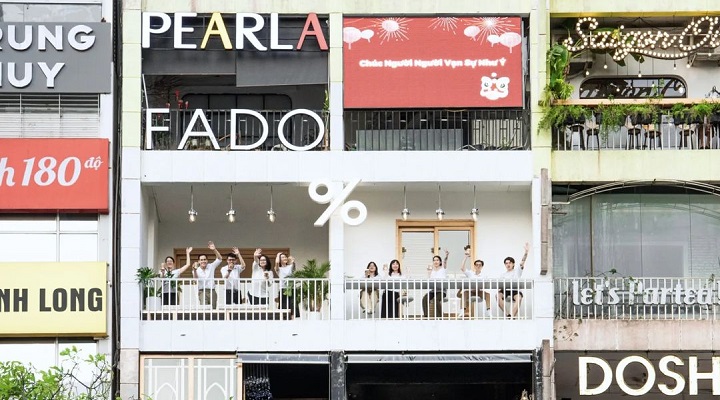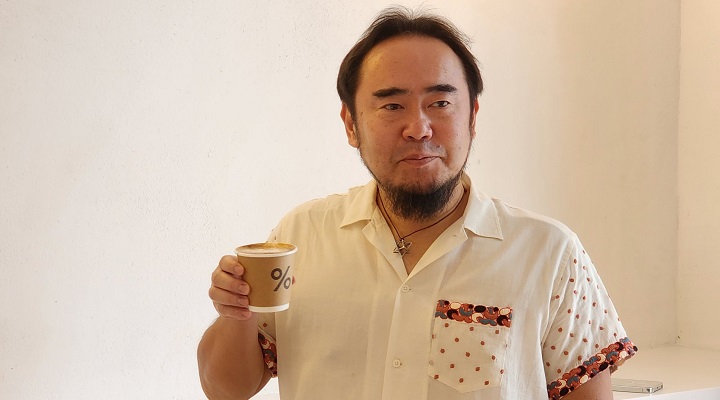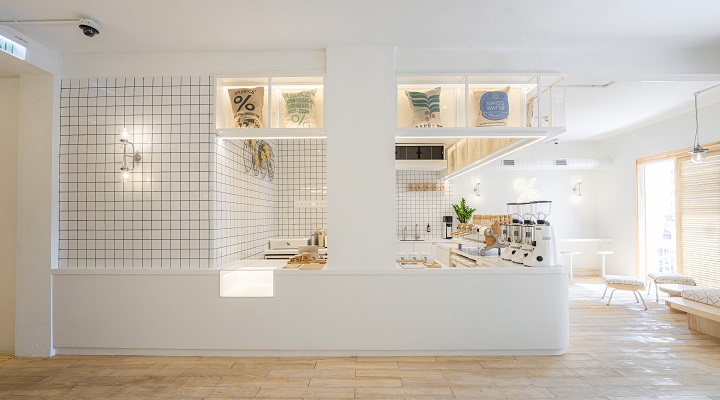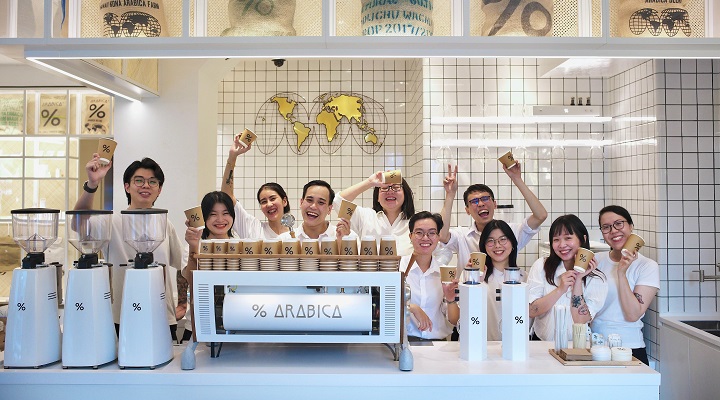After announcing plans to open in Vietnam three years ago, Japanese premium coffee chain % Arabica finally landed there this month. Located inside Ho Chi Minh City’s popular ‘Cafe Apartments’ building in the city’s bustling Nguyen Hue pedestrian zone, the design features a subtle Vietnamese influence, but its focus remains on local expatriates, international visitors and locals ‘in the know’ about the unique brand.
It has been a long wait for fans, with % Arabica’s foray into Vietnam announced back in 2019 shortly before the Covid-19 pandemic arrived. Now that the first cafe has finally opened, it has sparked much debate in a country renowned for its own unique coffee culture.
A large portion of Vietnam’s coffee-loving community on social media – particularly Gen Z – thought the brand had done a fantastic job integrating Vietnamese-style into the design of its first local cafe, but others were less impressed, especially by the premium price % Arabica commands wherever in the world it is served.
So what has Arabica accomplished in the Vietnam market after three years of preparation?
The cultural store design
% Arabica is well-known for its high-quality products as well as for its minimalist, Japanese-style design inspired by its founder, Kenneth Shoji.
From Japan to the US, % Arabica cafes all have the same design aesthetic, including tables and chairs in pure white and minimalist glass blocks. In Bangkok’s upmarket IconSiam shopping centre, the entire cafe is surrounded by a transparent glass box, so that the guests inside appear as if they’re in an aquarium.
However, with its first Vietnamese store, % Arabica has chosen a location on the fourth floor of a converted apartment building once slated for demolition, but now packed with cafes and boutiques. As one of the oldest modern-era buildings in Ho Chi Minh City, the Cafe Apartments was built in 1960 and has become a popular destination for Vietnamese as well as foreigners.

Designed by French creative company Cigue, the store is compact at just 100sqm and combines the brand’s typical basic, clean design approach with local architectural influences. Sliding doors at the entrance and an open-air deck are constructed from native timber and bamboo rattan. These materials also serve as a backdrop to parts of the serving area and an accessories display.
The entrance floor tiles match the ageing tiles of the building’s street entrance. Low-rise tables, another homage to Vietnamese custom – it is still common to see men squatting on tiny stools streetside sipping a Cafe Su Da or Phin Coffee served from a nearby cart – also contribute to the sensation of space. The whole space appears much larger because of a giant mirror that runs the length of one wall.
Kenneth Shoji told Inside Retail in a rare interview that he set out to create his first store in Vietnam as if it were a home. He said the brand wanted to flow with the history, style, and design of the building, which is how the idea of opening the first store in a converted apartment evolved.
“In Ho Chi Minh City the Apartment Cafe building is iconic and as soon as we saw it [three years ago] we knew we had to be here,” Shoji said.
Before opening in Ho Chi Minh City, a group of Vietnamese employees underwent extensive training in Japan. Vynce Nguyen, GM of local % Arabica partner The Kho Group, said the group spent 10 days in Kyoto learning how Arabica roasts and blends its coffee, along with barista techniques, before returning to train colleagues.

Keeping its own personality
Like Starbucks, % Arabica retains a standard price list and menu globally and it has refrained from offering local styles of coffee in Vietnam. A Caffe Latte at % Arabica costs 105,000VND (approximately US$4.50), while a Caffe Latte at Starbucks is only about US$3.40 for a larger Venti cup. Both are considered by Vietnamese as quite expensive when compared to local products which can sell for as little as US$1 in pavement cafes (and average $3 at local chains for a latte).
“I want % Arabica to be like a premium sushi chain in Japan. The sushi menu has not changed for hundreds of years and early every morning the chef goes to the fish market and selects the best seafood and then they prepare the food with care,” Shoji added.
“We want the same in our cafes.”
Shoji has made it obvious from day one that his vision is to deliver a premium, quality product and service served in a calm, relaxing environment.
He selects coffee beans from around the world – all Arabica – and blends them to maintain a consistent flavour wherever a cafe trades. He has sampled a few Vietnamese blends, but in a country where Robusta beans predominate, he has yet to find the right Arabica – but does not rule it out in the future.
Meanwhile, the brand is phasing out all plastic containers and will soon serve both hot and cold beverages in biodegradable paper cups as part of its commitment to sustainability. Straws made of sugar cane that are plant-based and biodegradable are imported from Taiwan.

International expansion
The Vietnam store is % Arabica’s 142nd store globally, and Shoji said he plans to open stores in Hanoi as well, but has yet to find a suitable location.
However, compared to other coffee brands like Starbucks, which has 33,000 stores globally, % Arabica has a “modest” number of locations worldwide. It has just one store so far in South Korea, the US and Taiwan, six in Singapore, four in Japan and more in Thailand. Greater China is the brand’s fastest-growing market, with 74 stores across the country already.
‘Iconic’ locations seem to be one of the most important factors for % Arabica when expanding in a foreign market. Last year, it launched its first South Korean location in Starfield Library, one of the most popular destinations in Seoul’s Gangnam district. In Egypt, it will launch inside a pyramid complex.
“We don’t want to be like Starbucks, we don’t want to be everywhere,” Shoji explained.
His dream is to grow % Arabica across unique lands and cultures of the world so that he can “see the world through coffee” and bring the best coffee to people. When asked about his plans for the Vietnam market, Shoji said he wanted to go slowly and focus on doing well in each new store, providing the best service to customers and pursuing the values of the brand.
“We don’t chase money,” he said.
% Arabica may be new to Vietnam as a brand, but in just one week, it has attracted a lot of attention from young Vietnamese thanks to its global fame and popularity on social media. The brand will launch its second store in Vietnam in April, which will feature a more minimalist design style, typical of its latest international stores, relying heavily on white and glass.







